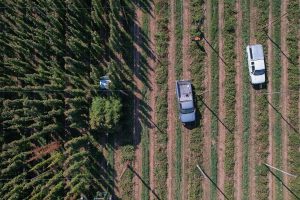Editor’s Note: This blog was written by Samantha Guerrero, the Community Organizer and Communications Coordinator at the Idaho Organization of Resource Councils, and edited by Adrian Gallo, the Climate Program Manager at the Idaho Conservation League. You can find this blog also posted on ICL’s website.

When it comes to climate change, one conversation that is gaining traction is the impact of climate on our farmworkers, the people who make sure we can have food on our tables. It is known that continued fossil fuel pollution will further disrupt our food systems, making food more difficult to grow and more expensive. While farmers have over a century of assistance from universities and the federal government, farmworkers have never been afforded the same concern. They are on the frontlines with little to no protections from employers or governments and are facing multiple injustices. For the past four years, the Idaho Immigrant Resource Alliance has mobilized and assisted community leaders on the ground to take emergency aid to the farmworker community.
There is a reason farmers in Idaho struggle to find workers and rely on undocumented, im/migrant communities. The work is some of the most dangerous in the world, with low pay, no benefits, no outdoor protections, and many health risks made worse by increasing extreme heat events and smoky days. A 2023 Bureau of Labor Statistics report shows the farming, fishing and forestry sectors have 38% higher worker fatality rate compared to any other occupation, and Hispanic/Latino worker fatality rates were almost 20% higher than the all-worker average. To add some color to these statistics, read stories from the dairy and sheep herding industries, as well as ongoing efforts from pesticide manufacturers to be legally exempt from poisoning farmworkers, as well as big businesses fighting to stop laws that protect outdoor workers from extreme heat.
Forget taking breaks when you need them even when we hit 100 degrees, employers aren’t required to provide water or breaks, unlike many neighboring states. Because farmworkers lack basic labor protections, you can forget about paid time off or any time off if you’re feeling sick, if your children need you, or if you’re having an emergency. Many workers are forced into silence over potentially losing their jobs and ability to make a living resulting in a decades-long pattern of under-reporting of injuries. The Idaho Department of Labor estimates that the highest migrant farmworker employment is in June (about 19,000 workers), with the largest population being located in the Treasure Valley. While we don’t currently have the capacity to reach them all, every year since 2020 we have been able to increase our efforts and reach throughout the state.
Until there are labor laws that can protect farmworkers from extreme heat and persistent smoke, the Idaho Immigrant Resource Alliance is stepping in to provide these workers with basic supplies. This is why we need to come to them and bring the resources, and we can use your help to reach more people. We are asking for donations to the 2024 JJ Saldaña Heat and Smoke Campaign to get emergency aid out such as water, cooling scarves, bandannas, hats, spf, electrolytes to as many farmworkers as we can. Any amount helps, and with smoky skies resulting in dangerous air quality in Southern Idaho, the need remains high. If you cannot provide a donation, you can still help farmworkers by sharing the donations page with your friends or family. You can also elevate farmworker stories and their voices by following our ongoing efforts on Instagram.
For us, it’s important to acknowledge who provides the labor when it comes to the agricultural industry and who are feeling the worst effects of climate change. Essential workers just want dignified working conditions which require the community to stand up and add farmworkers to the protections they deserve as outdoor workers. We need action now which is why your donation is crucial to saving the lives of farmworkers in danger of heat stress right now. Even as summer ends, the need does not. That’s why we’re motivated to continue our long-term policy goals that will minimize the effect of climate change on our environment and our local farmworkers. Stay tuned to learn about opportunities to continue this advocacy together.



